
[1] Anxious Interviewee
Sweating hands, a fast heartbeat, and an uneasy stomach, these are all symptoms associated with a pending job interview. Unfortunately for me, I was not able to avoid this illness on the day of my university mock interview, causing severe brain fog. However, it may prove beneficial to reflect upon the experience, as it will provide me with greater insight into how I can improve myself and prevent this issue from recurring. With this in mind, I will be using Boud’s model of reflection to determine the positive and negative aspects of this exercise, as it could improve my performance in future interviews and ultimately dictate whether I receive a job offer.
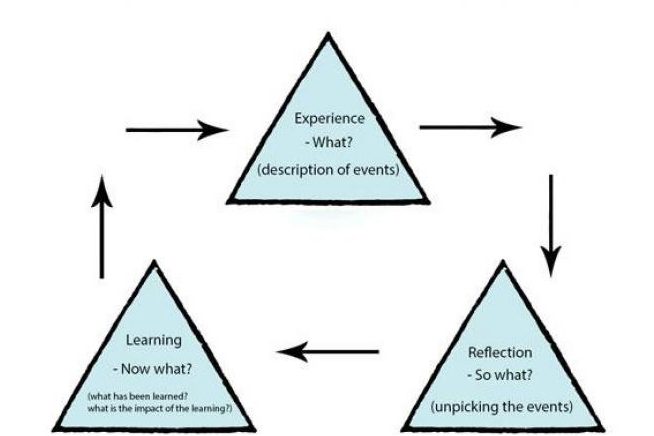
[2] Boud et Al’s Model of Reflection
“Reflection is an important human activity in which people recapture their experience, think about it, mull it over and evaluate it. It is this working with experience that is important in learning…”
Boud, 1985:19
If I’m so prepared, then why am I so nervous?
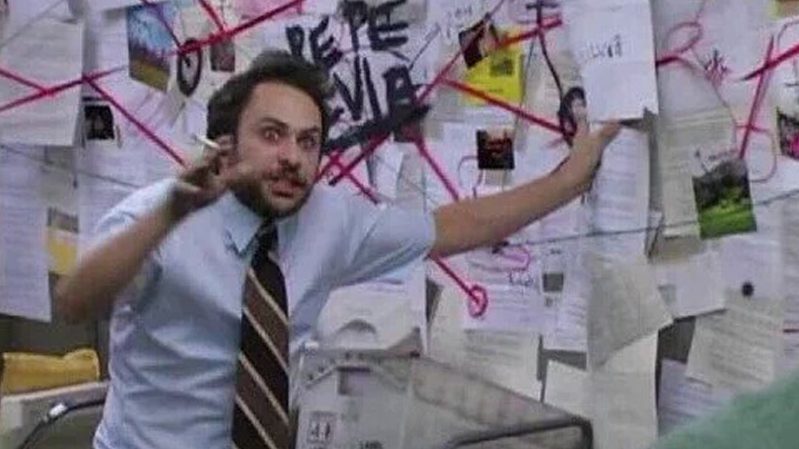
[3] Obsessively Planning
Before the interview began, I spent a rigorous amount of time preparing how I might answer some of the questions. First, I wrote all relevant information on my whiteboard in order to pinpoint what factors I thought were most important when ‘selling myself’ to these employers, such as my current work experience, academic qualifications, and filmmaking skillset. I knew that this was one aspect of the interview process that could give me confidence, as I believed that the longer I spent preparing, the easier the exercise would be.
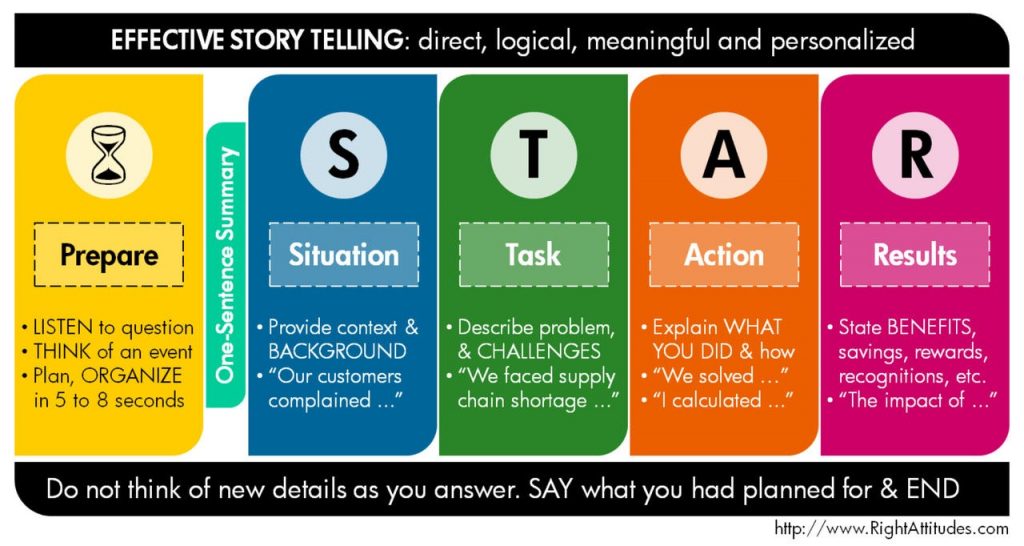
[4] The S.T.A.R. Method
With this foundation in place, I was able to construct my answers using the ‘S.T.A.R’ method, as I had been informed that it can significantly improve the performance and outcome of an interview. At first, I was hesitant about using this system for fear of sounding too ‘robotic’. However, I decided to trust my peers, as I have frequently been criticised in previous interviews for not including enough detail into my responses. Before the interview began, I felt prepared for anything that the panel could ask me, that was until my brain shut down and all my answers felt like they were crowding my mind minutes before we started, this was partially due to the fact that I would be interviewed first.
“It is essential to devote time and energy to perfecting the art of interview preparation if you want to stand out from the crowd and obtain your ideal job”
Sudheer and Baisden, 2023: 3
I quickly regained my composure after being asked about my experience as a videographer, a simple enough question that I knew how to answer confidently. Whilst talking, however, I then realised that I hadn’t been questioned by more than one interviewer before, as I was now unsure of who to look at. After a brief moment of looking around the room, I chose to make eye contact with the person asking the question, as this felt the most natural to me, despite isolating the other interviewers. I was then asked a scenario question about my experience with photography, a factor that I had overlooked in the job description. I thought I should respond quickly, as hesitancy could highlight that I hadn’t prepared for this question; as a result of this, I found myself using filler words like “hmm”, which further highlighted this issue to the panel. Despite this issue, I continued to speak confidently, as I knew that this key factor could assist in displaying that I was determined and knew what I was talking about. Finally, I was questioned about my knowledge of social media marketing. I saw this as my golden opportunity to salvage the interview by displaying my inside knowledge from previous social pages I had run. However, due to my passion for the subject, I spoke very quickly, therefore, making it difficult for the interviewer to understand. Overall, I felt there were some things that I did well during this interview, but there is much to be improved upon.
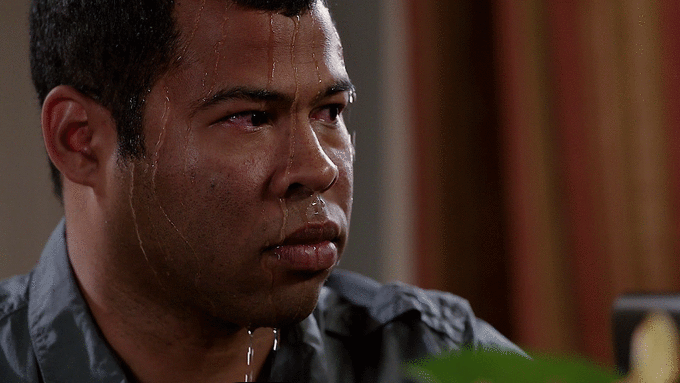
[5] Nervously Sweating
What actually happened?
Upon completing the exercise, I was given a feedback form detailing multiple aspects of my interview, such as my presentation, reflective skills, and the content I discussed. This proved to be beneficial, as it provided an unbiased perspective on my performance, as well as, highlighting areas that could be further developed.
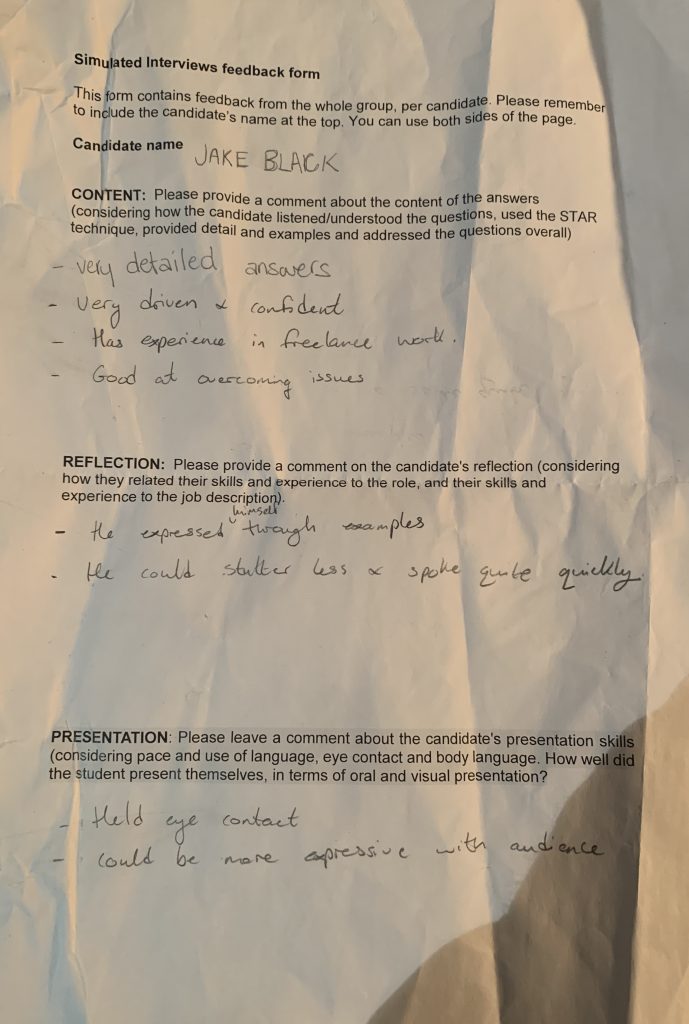
[6] Feedback Form
“…providing applicants with performance feedback after practice interviews can also be beneficial. Constructive feedback seems to help applicants feel more competent and confident about their interviewing skills and makes them more optimistic about the outcome of future (real) interviews”
Roulin, 2022: 67
First, the panel identified that I had detailed answers and used great examples, which I was pleased to hear due to my previous shortcomings on this aspect. However, I believe this improvement could be the result of implementing the ‘S.T.A.R’ method into my responses. Although I was hesitant at first, I now realise that it allowed me to include much more detail into my answers and smoothly transition to other topics I felt confident discussing, such as my previous work experience. Furthermore, this could also be a result of my organisational skills, due to the fact that I am a visual learner, mind-mapping allowed me to remember my answers and make my thoughts feel less ‘scattered’.
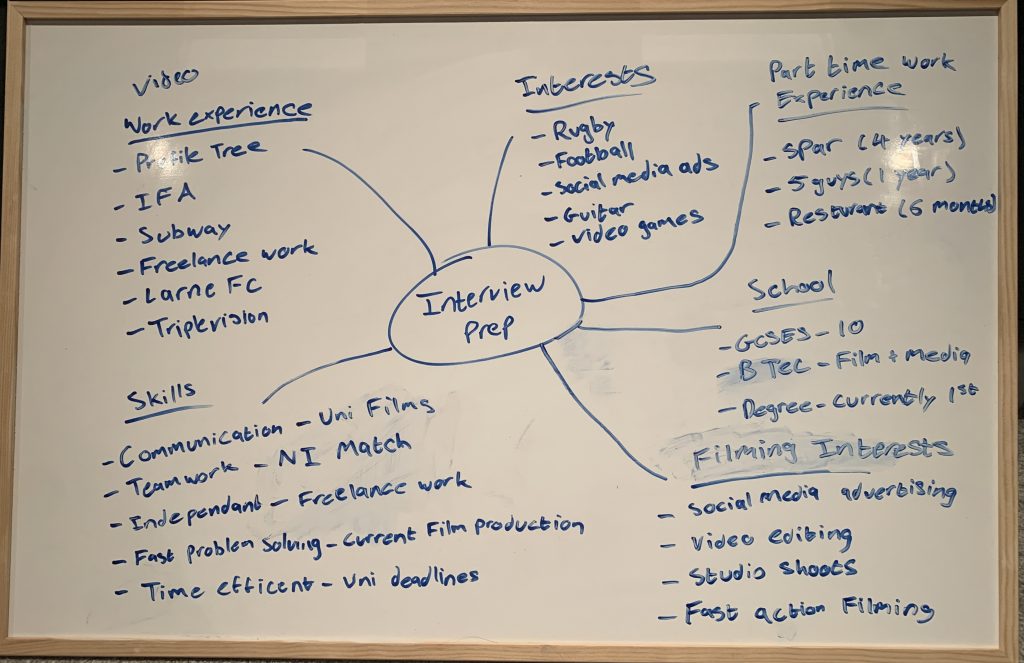
[7] Mind Mapping
Unfortunately, this preparation was not enough, as I overlooked a desired skill from the job interview, causing me to mumble and improvise an answer. Not only did this portray me as unprepared, but also shook my confidence, as I spent the rest of the interview attempting to compensate for my mistake. Upon reflection, it may have been beneficial to take a moment and plan my response rather than act hastily, this way my mind wouldn’t have worked into a frenzy, and I would be able to speak clearly. Furthermore, this was not the only issue regarding my linguistic skills during the interview, as the panel highlighted that I spoke too quickly during certain questions. Although this was due to my passion for short-form content creation, I now understand that I should slow down and pace myself when discussing these topics, as it depicted me as an energetic, raving lunatic. Despite feeling that I let myself down during this interview, the panel’s feedback highlighted that I maintained eye contact with each interviewer, even though I was unsure of where to look during most of the exercise. I was also pleased that the panel thought I spoke confidently throughout the interview, as this is another aspect of interviews that I tend to be criticised for. This exercise provided me with some confidence moving forward, as it highlighted the strong aspects of my interview technique, as well as areas requiring more development.
How do I move forward from this?
There is much to take from this exercise, as although I have highlighted my feelings about these issues, further action must be taken in order to prevent these mistakes from recurring. First, I must be more vigilant when researching the positions’ description, as although this was an exercise, my ill-preparedness could have cost me the job offer in an actual interview. Despite initially feeling very frustrated with this lapse of judgement, I now understand the true importance of a job description, as I was attempting to cover so much unnecessary information, that I forgot about what was actually important. In order to combat this problem, I should make note of all requirements and desirable skills listed in the posting and focus upon them, as it would allow me time to prepare an answer and not just improvise. In addition, I feel that my linguistic skills are another aspect that requires further attention, as I may have unintentionally misbranded myself as unsociable and awkward, both of which I am not. Furthermore, stuttering, stalling, and speaking too fast are all issues that can be fixed with practice, as I now understand that it is a common issue amongst interviewees. With the knowledge gained from this exercise, I now feel it could be beneficial to practice answering these questions with a friend before an actual interview, as it would allow me to monitor these mannerisms and display the best version of myself to employers. Finally, although I was able to adapt to being interviewed by more than one individual, this was yet another aspect that I had spent less time preparing for, as I foolishly thought it would be the same as a standard interview. Therefore, I believe it could be useful to practice a variety of different formats, such as group interviews or online tests, as it would give me more experience with these uncommon types of examinations.
In summary, this experience has developed my knowledge on my interviewing skillset, as although I made a number of mistakes, this exercise has provided me the opportunity to identify and learn from them prior to a real interview. With the benefit of hindsight, this reflective process has also provided me with a different outlook on the initial interview, as I now comprehend that not everything went as poorly as expected. As a result of this, I have now gained more confidence for my next interview and cured of the dreaded interview fever, at least for now…
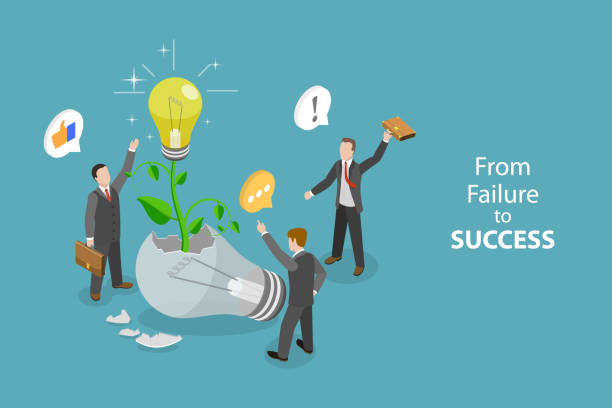
[8] Learning from Mistakes
References
Images
[1] Sambas, J (2018), 17 Smart Ways To Combat Interview Nerves, Available at: https://www.careeraddict.com/interview-nerves (Accessed 5th March 2024).
[2] Know Your Meme (2018), Pepe Silvia, Part of a Series on Its Always Sunny In Philadelphia, Available at: https://knowyourmeme.com/memes/pepe-silvia (Accessed 5th March 2024).
[3] Malkina, V (2020), How to Write Working Case Study? Use the STAR Method, Available at: https://medium.com/@nika.malkina01/how-to-show-your-professional-competences-on-the-interview-use-the-star-method-2e60cc4f7e00 (Accessed 5th March 2024).
[4] The Open University (2019), Models of Reflection- Core Concepts For Reflective Thinking, Available at https://www.open.edu/openlearn/mod/oucontent/view.php?id=51386§ion=4 (Accessed 5th March 2024).
[5] Tenor (2015), Sweating Jordan Peele – Key & Peele GIF, Available at: https://tenor.com/en-GB/view/sweat-sweating-sweaty-jordan-peele-key-and-peele-gif-4372619 (Accessed 5th March 2024).
[6] Black, J (2024) Reflective Feedback Sheet. Independent.
[7] Black, J (2024) Whiteboard Mind Map. Independent.
[8] iStock (2022), 3D Isometric Flat Vector Conceptual Illustration of From Failure To Success stock illustration, Available at: https://www.istockphoto.com/vector/3d-isometric-flat-vector-conceptual-illustration-of-from-failure-to-success-gm1401961282-455030079 (Accessed 5th March 2024).
Bibliography
Boud, D, Keogh, R and Walker, D. (2013) Reflection: Turning Experience into Learning, Queens University Library [Online]. Available at: https://qub.primo.exlibrisgroup.com/discovery/fulldisplay?docid=cdi_askewsholts_vlebooks_9781315059051&context=PC&vid=44QSUB_INST:QUB&lang=en&search_scope=QUB_Campus&adaptor=Primo%20Central&tab=QUB_Campus&query=any,contains,boud%20reflection&offset=0 (Accessed 1st March 2024). Page 19.
Baisden, A and Sudheer, J. (2023) React Interview Guide: Learn All You Need to Know to Ace Any React Interview and Land Your Dream Job, Queens University Library [Online]. Available at: https://qub.primo.exlibrisgroup.com/discovery/fulldisplay?docid=alma991008634905708046&context=L&vid=44QSUB_INST:QUB&lang=en&search_scope=QUB_Campus&adaptor=Local%20Search%20Engine&tab=QUB_Campus&query=any,contains,react%20interview%20guide (Accessed 2nd March 2024). Page 3.
Roulin, N. (2022), The Psychology of Job Interviews, Second Edition. Queens University Library [Online]. Available at: https://qub.primo.exlibrisgroup.com/discovery/fulldisplay?docid=cdi_askewsholts_vlebooks_9781000521948&context=PC&vid=44QSUB_INST:QUB&lang=en&search_scope=QUB_Campus&adaptor=Primo%20Central&tab=QUB_Campus&query=any,contains,The%20Psychology%20of%20Job%20Interviews&offset=0 (Accessed 4th March 2024). Page 67.